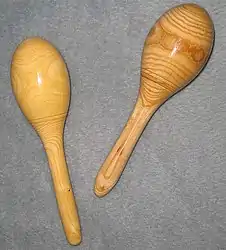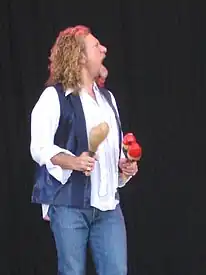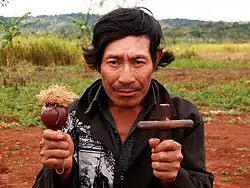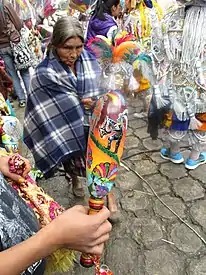Maraca
A maraca (ⓘ), sometimes called shaker or chac-chac,[1] is a rattle which appears in many genres of Caribbean and Latin music. It is shaken by a handle and usually played as part of a pair.
 | |
| Percussion instrument | |
|---|---|
| Classification | Percussion |
| Hornbostel–Sachs classification | 112.1 (Shaken idiophones or rattles) |
| Related instruments | |
| Shekere | |
| Musicians | |
| Machito, Monguito | |
| Builders | |
| LP Percussion | |
| Sound sample | |
Maracas (from Guaraní mbaracás),[2] also known as tamaracas, were rattles of divination, an oracle of the Brazilian Tupinamba people, found also with other Indigenous ethnic groups, such as the Guarani, Orinoco and in Florida. Rattles made from Lagenaria gourds are being shaken by the natural grip, while the round Crescentia calabash fruits are fitted to a handle.[3] Human hair is sometimes fastened on the top, and a slit is cut in it to represent a mouth, through which their shamans (payes) made it utter its responses. A few pebbles are inserted to make it rattle and it is crowned with the red feathers of the guarás (scarlet ibis). It was used at their dances and to heal the sick.[4] Andean curanderos (healers) use maracas in their healing rites.[5]
Modern maraca balls are also made of leather, wood or plastic.[6]
A maraca player in Spanish is a maraquero.
Gallery
 Robert Plant playing two pairs of maracas
Robert Plant playing two pairs of maracas Guarani shaman holding cross and maraca
Guarani shaman holding cross and maraca A maraca used by the knights of Toritos de Chichicastenango, danced for the feast of Saint Thomas, around December 21. Each maraca is unique and made specially for each year
A maraca used by the knights of Toritos de Chichicastenango, danced for the feast of Saint Thomas, around December 21. Each maraca is unique and made specially for each year
References
- Mendes, John (1976). Cote ce Cote la: Trinidad and Tobago Dictionary. Arima, Trinidad: Syncreators. p. 135.
- Antonio Ruiz de Montoya (1876), "Mbaracá", Vocabulario y tesoro de la lengua Guarani (ó mas bien Tupi), vol. 2, Frick, p. 212b
- Julian H. Steward, ed. (1948), Handbook of South American Indians, vol. 3, U.S. Government Printing Office, pp. 43, 129, 238
- Robert Southey (1810), History of Brazil, vol. 1, Longman & Hurst, pp. 187–188, 635 Note: guarás is spelled idiosyncratically as "goaraz" in this historical source.
- Federico Kauffmann Doig (2005), "SOUTH AMERICAN INDIANS: INDIANS OF THE ANDES IN THE PRE-INCA PERIOD", in Lindsay Jones (ed.), Encyclopedia of Religion, vol. 13 (2nd ed.), Gale, pp. 8599–8605, ISBN 0-02-865982-1
- Blades, James (1992). Percussion instruments and their history (Rev. ed.). Westport, Conn.: Bold Strummer. ISBN 0-933224-61-3.
External links
 Media related to Maracas at Wikimedia Commons
Media related to Maracas at Wikimedia Commons